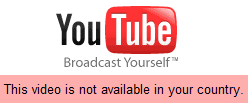Brazilian justice orders removal of YouTube video
The court in the Brazilian state Ceará ruled that Google Brazil removes a video on YouTube and refrain from placing again this video on their site. The video shows the three businessmen robbing a store in a mall in Fortaleza. In the images, trio is accused of robbing a store in a mall in Fortaleza. The images show the trio removing objects to repossess the property, that was illegally sublet.
In the lawsuit, the three entrepreneurs reported feeling morally harmed, and therefore requested the removal of the video. They further demand that YouTube refrains again to place the video on the network. They also requested Google to show the identity of the user who has uploaded the video on the YouTube network, the IP-address and further identification of the user who placed the video on YouTube. They also asked for compensation for moral damages.
Trio asked Google to remove the videos
In the lawsuit, entrepreneurs explained they heave been having been in contact with Google and YouTube Brazil by phone and email to get the video removed. According to the records, four days later, the General Counsel of YouTube reported that removal should be done by the user who posted the video and said obey whatever decision was determined by the courts.
The court notes in its statement that all jurisprudence assumes that such slanderous videos may not be published, especially when there is not a condemnation of the criminals in a lawsuit. In case of breach of the measure, the daily fine is R$ 3000.
However, after being convicted in the first instance, the Google Internet Brazil filed an interlocutory appeal before the court. The company requested that the injunction was limited the obligation to remove the video from YouTube, finding that “there is no means to carry out the monitoring on the previous content circulating on the Internet.” Also argued not be able to “keep adding new content in YouTube videos and much less clear in third party sites”.
Brazil requests most take down of content
In 2010 Google reported that Brazil was the country with most requests from its government to take down content. In the same year a law was approved that banned political satire on election years.
On 9 August 2011, the Federal Justice of Minas Gerais blocked the distribution of A Serbian Film, a 2010 Serbian horror film, in Brazil. This was the first time a movie was banned in Brazil since the promulgation of the 1988 Constitution. The previously banned film, Je vous salue, Marie a 1985 French film written and directed by Jean-Luc Godard that retells of the story of a virgin birth, was banned in 1986.[21] As of 2012 this decision has been overturned and the film given a “not recommended for those under the age of 18, due to depictions of sex, pedophilia, violence and cruelty” rating.
Arrest of Google’s most senior executive in Brazil
In September 2012 an elections court in Brazil ordered the arrest of Fábio José Silva Coelho, Google’s most senior executive in the country, after the company failed to take down YouTube videos attacking a local mayoral candidate. The stringent 1965 Electoral Code bans campaign ads that “offend the dignity or decorum” of a candidate. Google is appealing the order, which comes after a similar decision by another Brazilian elections judge. In that case, the judge found a different senior executive responsible for violating local election law after the company refused to take down a YouTube video mocking a mayoral candidate. Another judge overruled that decision and wrote that “Google is not the intellectual author of the video, it did not post the file, and for that reason it cannot be punished for its propagation.” Google also defended users’ political rights saying “that voters have a right to use the Internet to freely express their opinions about candidates for political office, as a form of full exercise of democracy, especially during electoral campaigns”.
Sources:
Tribunal de Justiça do Ceará


